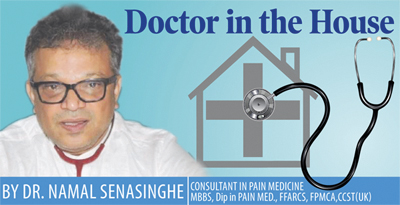
Pain is a topic of universal interest and it is one of the commonest symptoms in medicine. This article is to discuss about the psychiatric and psychological aspects of chronic pain .The patients who experience pain is a sensory phenomenon but it is paramount to identify how it is linked to emotional factors .The intensity of pain varies with the state of mind of the individual .
 Muscle tension is increased in certain mental disorders such as depression, anxiety, post traumatic stress disorder (PTSD), stress related conditions.
Muscle tension is increased in certain mental disorders such as depression, anxiety, post traumatic stress disorder (PTSD), stress related conditions.
It is also evident that chronic pain could be associated with substance abuse, personality disorders, various somatoform disorders such as conversion disorders, hypochondriasis and somatisation disorders.
It is important to identify the underlying psychiatric/psychological disorder as it could exacerbate the pain and impede recovery of pain. Identifying and treating the underlying psychiatric disorder is essential to successfully treat the patients with chronic pain.
At the same time the clinicians must be cautious not to assume that chronic pain symptoms that cannot be accounted are due to psychiatric disorders i.e. pain is in your head.
It is important to pursue the psychological assessments are carried out to make certain not to overlook any psychological issues linked to the pain.
Depression is a contributory factor in chronic pain possibly due to helplessness and demoralisation related to the disability .
There is a fairly large psychodynamic literature that suggests certain personality traits and mental mechanisms (e.g., dependence, identification, and low self-esteem) place people with particular personality types at risk of chronic pain. For example fibromyalgia pain has strong links to depression and anxiety.
Living with chronic pain is physically and emotionally stressful .Chronic pain is known to change the level of stress hormones and neuro chemicals found in the brain and the nervous system. These can affect the mood, thinking and behaviour.
Chronic pain can be challenging to treat and as a result patients are likely to end up with poly pharmacy (different types of medication prescribed at the same time) as a result of visiting many doctors and consultants especially in Sri Lanka for the same condition. Poly pharmacy can lead to depression as a side effect of medications .The over use of three types of medications that can contribute to low mood are opiate analgesics, benzodiazepines and non barbiturate hypnotics.
Appropriate psychotropic medication can be used in patients with underlying psychological/ psychiatric issues prior to other modalities in treating pain such as complimentary therapy, Interventions.
The non pharmacological methods are recommended to treat chronic pain related to stress. One such therapy is cognitive behavioural therapy ( CBT ). Psychotherapy In combination with behavioural therapy and cognitive therapy has been found useful in the treatment in some patients with chronic pain (Turner &Chapman 1982).
The cognitive-behavioral approach to chronic pain teaches the patient specific cognitive skills (i.e. anticipating the occurrence of pain and diverting them attention to non painful thoughts) helping the patient to become aware of psychosocial influences that affect the pain experience, all of which may allow better coping with pain (Turk and Meichenbaum, 1984; Weisenberg, 1984).
The other methods such as physical activity, exercise, mindfulness meditation and learning coping skills will be helpful.
Pain rehabilitation programs such as pain management programs typically provide the multidisciplinary team approach including both medical and psychiatric treatments to manage the pain. This is well established in the west.
In my experience having worked in England and also in Sri Lanka I find pain related to psychological factors are more common in England than in Sri Lanka. Sri Lankan way of life is happy go lucky.
I find a large group of patients diagnosed with fibromyalgia in England than in SL. But I have come across patients who are wrongly diagnosed as having fibromyalgia in Sri Lanka. I have also noticed Sri Lankan’s being more anxious than depressed. It’s the opposite in England.
Depression and pain can be like the chicken and the egg. Difficult to find out which came first. Therefore it is important to break the cycle prior to managing the pain. Duloxetine, Amitriptyline and Dothiopin which are anti depressants can be used to treat pain.
Even though they are antidepressants it acts on the nerves causing pain and inhibit the impulses. Fluoxetine (Prozac) and Citalopram can be used to treat depression and anxiety.
After sorting out the anxiety and depression in the group who suffer with symptoms (low mood, lethargy, worthlessness) definitive treatment of pain with
medication
Complimentary therapy
Interventions
we can expect better results.
Please note that all patients with pain do not suffer with psychological issues. It’s a small percentage in Sri Lanka.
I would like to thank Dr Ruvini Senasinghe MBBS, DPM, MSc, MHSC, MRCPsych (Lon) consultant psychiatristin the United Kingdom for her expertise on this topic.
Dr NAMAL SENASINGHE
MBBS, FFARCS, Dip in pain med, FFPMCA,CCST (UK)
Consultant in Pain Medicine
London Pain Clinic
31, Horton Place
Colombo 07
Sri Lanka
Tel - 0767155716 (Hot Line)
